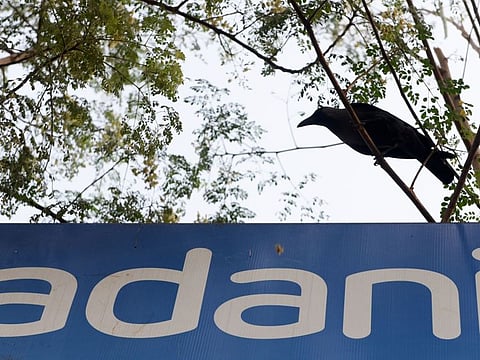Adani rout crosses $51 billion as stocks plunge by daily limits
Adani Enterprises lost almost 19 per cent on Friday, the most since 2017

Mumbai: The selloff in Gautam Adani’s corporate empire accelerated on Friday, erasing more than $51 billion of market value in two sessions as Asia’s richest man struggles to contain the fallout from a scathing report by US short seller Hindenburg Research.
The rout is piling pressure on the Indian tycoon as it erodes his net worth and threatens to sour investor sentiment toward the $2.5 billion share sale by his flagship firm Adani Enterprises Ltd. Losses deepened even after the Adani Group disputed Hindenburg’s allegations in a Thursday call with bondholders and pledged to release a detailed rebuttal on Friday.
Adani Enterprises lost almost 19 per cent on Friday, the most since 2017. The stock closed about 11 per cent below the lower end of the price band set for the follow-on equity sale. Some units like Adani Green Energy and Adani Total Gas plunged by the daily 20 per cent limit, adding to a $12 billion selloff in group companies on Wednesday. Volumes in these stocks were at least triple their three-month average.
Benchmark index down
The selloff hit sentiment in the broader Indian market as trading resumed after Thursday’s holiday. The benchmark NSE Nifty 50 Index lost 1.6 per cent, the worst performance in Asia, with bank stocks among those leading losses as investors fretted over their exposure to the Adani group.
“The issues strike at the heart of the Indian corporate sector scene where a number of family-controlled conglomerates dominate,” said Gary Dugan, CEO of the Global CIO Office. “By their very nature they are opaque, and global investors have to take on trust the issues of corporate governance.”
Adani wealth
The slump in Adani shares follows breathtaking gains in recent years, including some of Asia’s biggest returns in 2022. The five-year advance in Adani Enterprises trumped even the likes of Elon Musk’s Tesla Inc., vaulting Adani from relative obscurity into the ranks of the world’s richest people.
The current rout has plunged Adani’s fortune below the $100 billion threshold he surpassed in April last year. It stood at about $93 billion at the close in Mumbai, according to the Bloomberg Billionaires Index. Taken together, he’s lost roughly $26 billion since Hindenburg’s report was published, more than one-fifth of his fortune.
Concerns about the group’s finances have percolated throughout the tycoon’s rise, with CreditSights saying in August that Adani’s conglomerate is “deeply overleveraged” with “stretched balance sheets.” But the Hindenburg report has put an unprecedented spotlight on the group’s corporate governance “- as well as that of India as a whole.
Adani Group has said it’s exploring legal action after a “maliciously mischievous, unresearched” report by the short seller. Hindenburg has said it fully stands by its report, adding that any legal action taken against it would be meritless, according to a statement on Twitter.
Companies linked to Adani Group plan a detailed response Friday to the report that they labeled as “bogus,” according to bondholders who joined a conference call with Adani executives. On the call, investors were told that the US-based short seller’s assertions of accounting fraud were “devoid of facts.”
“It seems like there might be more downside and this report can become a big legal issue as it is causing reputational damage too,” said Sameer Kalra, founder of Target Investing in Mumbai.
IHC's response
Abu Dhabi-based International Holding Co., which has invested almost $2 billion in companies owned by billionaire Gautam Adani, said its business decisions are based on facts after a scathing report on the Indian tycoon's business empire by US short-seller Hindenburg Research. "Our business decisions are purely based on an analysis of objective facts," said Ahmad Ibrahim, a spokesman for IHC, in a statement to Bloomberg. That's "aided by the use of business intelligence and our analytics tools, which help us to achieve the maximum benefits for our shareholders under the corporate governance regulation." "As a policy, IHC does not comment on other organizations' business activities," IHC's Ibrahim said.
Share sale
Hindenburg Research released its report just as Adani Enterprises was seeking to attract a broader network of local and global investors for its share sale. The transaction, India’s biggest ever primary follow-on public offering, had already lured a number of anchor investors before the Hindenburg report emerged, though retail investors and high net worth individuals can bid for shares starting today through January 31.
Overall subscription for the offering was at 1 per cent as of 3:30 pm in Mumbai. The portion reserved for retail investors was sold 1 per cent while company employees put in bids for 4 per cent of the shares offered, stock exchange data showed. Investors in Indian public offerings typically wait until the last day of the sale to place bids.
Some market watchers said the impact to the broader market will be limited.
The bulk of India’s equity benchmarks are made up of “very high quality” banks, consumer and IT services companies, and the risk to the indexes from Hindenburg Research’s report on Adani Group “is not meaningful,” Neelkanth Mishra, co-head of Asia Pacific equity strategy and India equity strategist at Credit Suisse, said on Bloomberg Television.
Sign up for the Daily Briefing
Get the latest news and updates straight to your inbox



